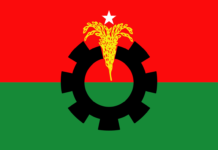 The violent political impasse in Bangladesh is impeding the economic progress that will be needed to lift more than 60 million people out of extreme poverty, says the United States.
The violent political impasse in Bangladesh is impeding the economic progress that will be needed to lift more than 60 million people out of extreme poverty, says the United States.
US assistant secretary of state for South and Central Asian affairs Nisha Deshai Biswal, however, welcomed the recent lull in violence and also urged the government of Bangladesh to restore and rejuvenate its democratic institutions – including support for freedom of expression, especially by the media, and space for peaceful protest and dissent.
She came up with the observation while making her statement on the US Rebalance in South Asia: Foreign Aid and Development Priorities before the House Foreign Affairs Committee on Asia and the Pacific on March 24.
She mentioned that just last week the IMF blamed the political disruptions in its reduced growth projection for Bangladesh.
Biswal said Bangladesh has the potential to become a model of a modern, prosperous, strong, and inclusive country that connects the economies of South and Southeast Asia – but to seize this potential will require a reversal of negative governance trends, as well as political leadership that eschews violence and puts people before party politics.
She mentioned that the US strongly condemned the violence that has killed and injured scores of people in Bangladesh.
She also said, “We can clearly see what is possible in Bangladesh because our assistance programmes there have yielded some of the best returns on investment in the world: mortality of infants under 5 has been reduced by 60 percent and maternal ortality by 66 percent. Rice shortages have been turned into surpluses.”
The US official said protected forests are mitigating the impacts of climate change.
“US assistance to Bangladesh aids the country’s long-term development and stability, and is channeled through three presidential initiatives – Feed the Future,
Global Climate Change, and Global Health.”
She said their assistance addresses persistent challenges in the areas of agricultural productivity and crop diversity, health care, nutrition, vulnerability to natural disasters, governance, and the rule of law, and seeks to support efforts to stabilise Bangladesh’s
democracy.
Source: Prothom Alo









